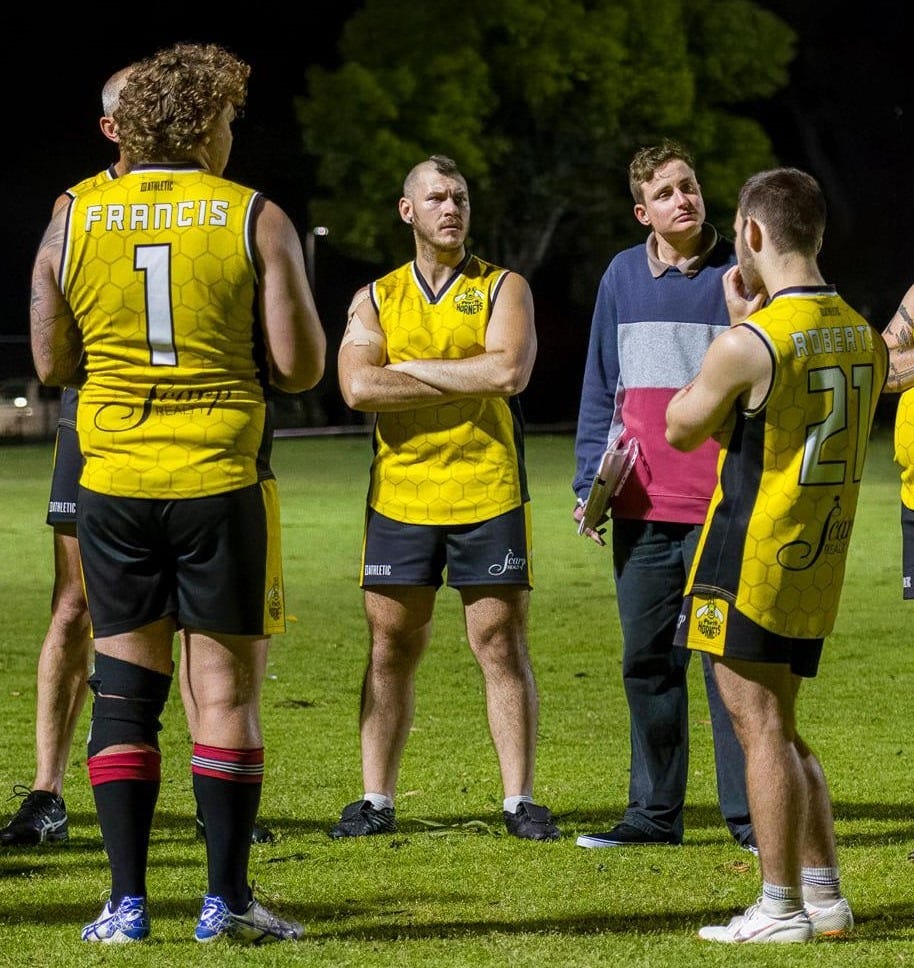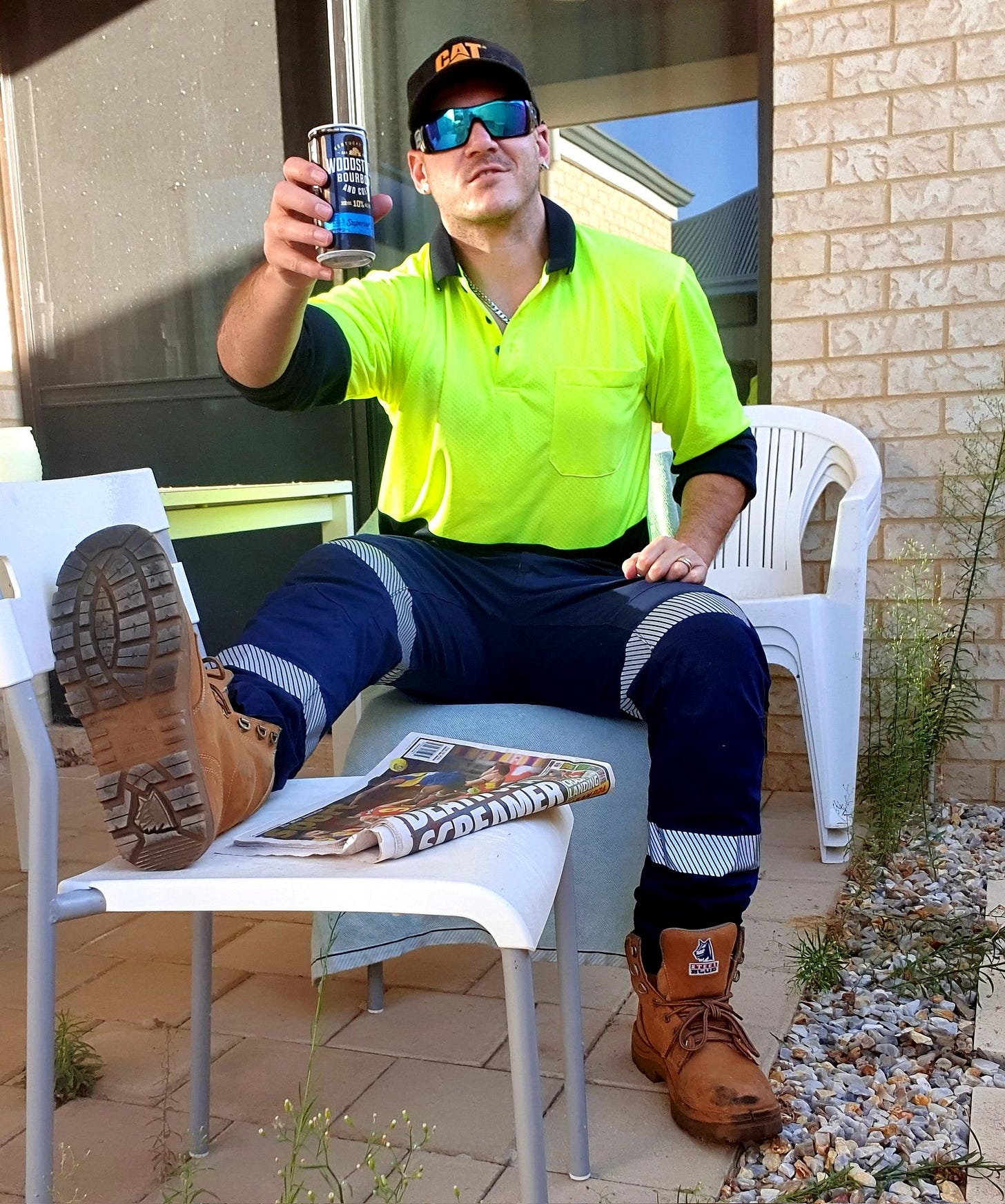Why I wrote a book about gay tradies and FIFO workers
Plus "write what you know", same-sex marriage, and my wildest fantasy(!)
Q. A lot of tradie and FIFO guys are sexually fluid/bi are you going to explore this in ur work?
A. Yes – and since this question was asked, I have published the book that explores this. King of Dirt is specifically focused on a bisexual tradie who’s worked FIFO (“fly in/fly out”) minesite jobs for years.
The main character, Jack Brolo, is an excavator operator and labourer who is bisexual and the story focuses on him coming to terms with his attraction to men and exploring it at last as he reaches his mid-thirties. He also gets to experiment with other gay and bi tradesmen: Leaf, a diesel mechanic; Brick, a former FIFO worker turned personal trainer; Spencer, a traffic controller; and a few other miscellaneous tradies he roots along the way.
I wrote Jack to reflect myself, as I’ve worked as a labourer and excavator operator at various times in my life. I also hooked up with many gay tradies back in the day, and have had many gay tradies find me as fans of my work since I got published: they relate to my characters. This is to say: I’m not that rare and Jack Brolo isn’t that rare. There are thousands of guys like us out there in the world – we just don’t get represented in books or TV or movies.
It always struck me as so weird that there was no representation of guys like us. In media and texts, “gay” always seemed to be presented in a very one-dimensional way as meaning “inner city, camp, effeminate”. There was never any space given to the country gays or the more masculine gay guys out there or anyone who deviated from a very narrow stereotype. Plenty of gay guys in Australia are no different to your average working-class bloke or bogan, other than we like blokes. Of course, there’s nothing wrong with being stereotypically “gay” either – which was a point I tried to make with Brayden in The Brink. But there are lots of us who don’t fit that mould so well, or at all – like Mason in that same book – and we kind of crave to be understood and accepted just as we are: blokes who like blokes.
I’m happy to have this book out there as I feel like I’m showing myself in Jack Brolo in a way I haven’t with any other character before, and in a way that I don’t think has been specifically done in a book before this. Like me, Jack’s a labourer, he’s a drinker and a smoker and a gambler, he’s a footy fan, he loves his V8 ute, he loves his heavy metal, he loves the gym, he’s just a general rough and tough bloke in his demeanour – and he just happens to be attracted to guys. But that doesn’t change who he is.
More importantly, he’s not – as one otherwise very good review put it – ‘tortured by masculinity’. That is such a misreading of the masculine homosexual character. Jack loves the world and the blokey space that he’s in. He doesn’t want to change it. What he doesn’t love is not being able to bring his whole self to that world: not being able to tell other guys that he’s into men. His ideal world would be where he can go to the pub on a Friday night with his mates from work, and throw his arm around Brick beside him, and all of them watch the footy and get on the piss together without any shame or hiding.
I hope guys like Jack who read this book will feel seen, and feel like it’s okay to be just how they are. It’s a book I wish I’d had access to when I was trying to work my sexuality out back in the day. There’s more than one way to be a gay man.
Q. The saying "write what you know" … do u agree? Is all fiction essentially autobiographical in part?
A. Kinda. I reckon different authors approach things differently. My fiction tends to be very heavily informed by my lived experience. It tends to be that the plot and characters are made up but some of their thoughts and feelings are drawn from my own. But that’s only my process, and other authors will no doubt have much more distance between them and their characters.
I do think it’s really important that fiction authors are able to write beyond what we know – because if we can’t, we’re just writing non-fiction. And lots of genres like fantasy and sci-fi and horror require the author to extrapolate and speculate: you can’t solely draw from what you know when you’re writing genre. We have to be free to write what we don’t know, and instead, write what we imagine. It’s vital. Even in my contemporary fiction where characters like Jack Brolo are very similar to me – I’m still imagining a life and a world that isn’t mine. I’ve never been to Eucla or seen the Nullarbor Plain but I still wrote about it by researching and by imagining.
Writing what you know, to some extent, often yields writing that carries more authenticity though – especially I think in contemporary/literary fiction – so I do see the value in it as a starting point, at least.
Q. When growing up did u ever think gay marriage would be legal, find a life partner?
Nope! Gay marriage was never on my radar growing up. The only touchpoint I had for it was that season two episode of Friends with the lesbian wedding and that was seen as this funny/frivolous thing (though it’s worth noting the show was pushing boundaries by including it at all).
I was raised Roman Catholic and once I realised I had some homosexual feelings, I became staunchly anti-gay and anti-same-sex-marriage for a time, so if someone had asked me in that era, I would’ve said I was opposed to it.
When I was sixteen and seventeen I did not ever imagine having an actual boyfriend or husband. At best – and this is fucken bleak – I used to imagine that maybe I could get married, have kids and raise a family, and then maybe once my kids were grown up and had left home, and my wife had passed away(!), then I could be free to privately and secretly hook up with guys in like my fifties. That is a dire thought for a teenager to go to bed with every night.
I also daydreamed of fleeing to Europe backpacking the moment I turned eighteen, so I could get far enough away from everyone I knew and be in a place with gay men and finally experiment with my homosexuality. I saved up from the age of fourteen working as a supermarket storeman/floor boy, and the week after I turned eighteen, I jumped on a plane to London and got to be gay at last. It was a much better plan than the alternative.
But no, the idea of wedded bliss with a man, of both having and being a husband, that was never on my radar as a young man. I am now married to my husband Raphael and very happy I found a way to come out and live the life I wanted.
Q. What's your biggest dream, greatest fear, and wildest fantasy?
A. Well this is a wild gauntlet of a question isn’t it.
My biggest dream … is well known: to be an author who lives off his writing income long-term. I spose the unsaid part of that dream is that I want that so I can build the kind of life I want: buy a nice property for me and my husband to live in, maybe somewhere big enough for a dirt bike or a quad bike or some dogs or some kids. Be able to do more mods to my two cars: my V8 ute and my vintage Mini. Be able to travel and take holidays. Be able to focus on my bodybuilding goals. I’d like financial stability so that I could generate life stability. It’s nowhere near as easy as it seems but I’m trying.
My greatest fear … it’s hard to pinpoint a specific one, but I guess I’ll answer this by maybe saying fear itself. I’ve struggled with anxiety and panic disorder in the past and I wouldn’t wish that on anyone, because fear takes over your life and it ruins your mental health and cripples so many aspects of your life. I’m doing much better these days but it’s still something to manage from time to time. My grandpa – who died before I was born – apparently used to repeat the maxim that the only thing to fear is fear itself. I reckon that’s solid advice.
My wildest fantasy … oh man, where do I even take this without making it about sex? There are about twenty things I wanna say here but … I’ll keep it non-sexual for once.
My life fantasies were explored in Invisible Boys in that Charlie and Hammer were kinda wish fulfilment on my part. I love rock music and I love footy and I would have loved to be a rockstar or an AFL footballer.
The former is weirdly more realistic than the latter. Music is life for me, so Charlie’s ambitions in Invisible Boys are my own. I wish I could sing better and play guitar well and if I had those talents, I would have loved to be a big punk rock superstar like Dexter Holland or Billie Joe Armstrong. I already have the ego and personality for it, just none of the musical abilities, sadly - ha. I sing very often around the house and when driving in the ute, but my singing voice is only okay-ish, and definitely not “good” or “great”. At uni I used to write a lot of song lyrics for songs that were never sung: I liked using words and making some edgy lyrics with them, but I had no talent for forming a tune. When I was about 30, I tried learning to play guitar with some lessons at a music school and I sucked at it, so hard. But if I had the talent I would’ve loved it.
Even more of an outlandish fantasy: I wish I could’ve been an amazing footy star like Hammer and been a gun AFL player. This was absolutely never on the cards for me as a possibility – I am simply not talented as a football player in any way – and I knew that from a very young age and so this one, unlike music, was always relegated to ‘not even maybe an option’. But I love footy and I’ve played it socially and it’s a fun team sport. I have to settle for playing AFL 9s socially – when I can – and watching Collingwood play on TV each weekend. But in my wildest fantasy? I’d be like Brayden Maynard or Jamie Elliott or Jack Crisp. A boy can dream.
Holden










Could not agree more with your approach to writing about queerness in men and escaping stereotypes that don't apply to everyone. Thanks for being here and thanks for another amazing book
Really love this, Holden, thank you for sharing xx